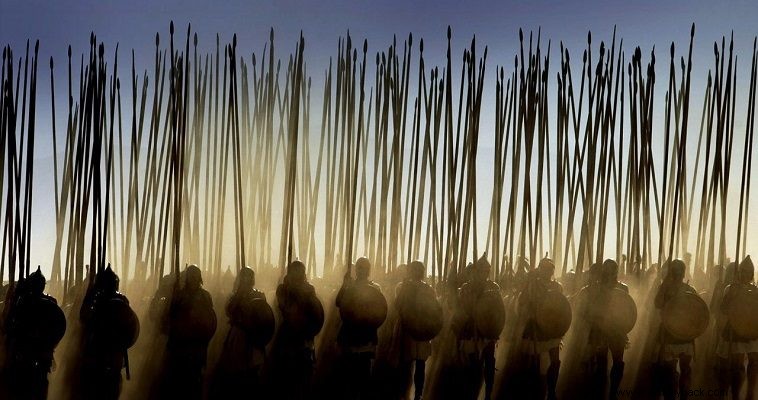
It would be sacrilege, indeed, to say something about the strategic and tactical abilities of the great Greek soldier Alexander. His campaign against the Illyrians is a prime example of their skill and ingenuity.
Immediately after the death of Philip's father, Alexander was proclaimed king of Macedonia. From the start, the young king found himself in the need to fight with the predatory neighbors Illyrians, specifically with the forces of the kings Cleitus of the Dardanians and Glaucia of the Taulants. The two kings had declared submission to Philip but now considered the moment opportune to rebel, seeing the young Alexander as an easy opponent. At the same time, many southern Greek cities, including Athens and Thebes, renounced the alliance with Macedonia.
However, Alexander first decided to settle his accounts with the Illyrians who had come and were threatening the fortified city of the Greek Chaons Pellion, near Lake Ohrid , which controlled the routes from Macedonia to today's Albania. After coming to an agreement with the loyal king of the Agrians, Lagarus, to secure the north-eastern borders of Macedonia, he moved against the enemies. As Alexander approached Pellion, he was informed of the capture of the city by Cleito of the Dardanians, who was waiting there for his ally Glaucias.
Alexander had 15,000 men and intended to attack the city immediately, before Glaucias' reinforcements arrived. A first attack failed. So he changed his mind as the area of the city that the Illyrians had burned was a fortress and the Illyrians had also fortified the surrounding hills. For this Alexander camped with his men near the city. Alexander understood that in order to be able to attack the city he would have to clear the surrounding heights of enemies. Indeed, he managed to conquer several heights as a result of which the enemies retreated inside the city. However, a little later Glaukias arrived with his men and recaptured the heights.
After this development, Alexander found himself in a particularly difficult situation. It was between two enemy armies and faced a lack of supplies, as the Illyrians occupied the pass from where the Greeks were supplied. To deal with the shortages he sent his general Philotas to collect supplies. Glaucias attacked Philotas and put a lot of pressure on him. Then Alexander intervened, with the famous Defenders them, the Agrianes spearmen and fine archers , forcing the enemies to retreat. After this Alexander decided to retake the hills that dominated the rear of his camp. Glaucias had seized the passage there, blocking Alexander's supply.
Battle in the pass
The passage was particularly narrow with a width, according to the ancient authors, of about 4 m. Alexander left a small part of his army to guard Cleitus at Pellion, and with the rest of his men moved before the pass. There he commanded the Macedonian phalanx to a depth of 120 men, deploying 200 horsemen on either side of it. With this formation, the Greeks began to perform exercises in dense order in absolute silence so that the orders of the officers could be heard.
When the signal was given the sarissas were raised vertically and then those of the first scales were lowered. The Macedonians in perfect formation began to move sometimes closing to the right and sometimes to the left, transforming the dense phalanx into a line and vice versa. The Illyrians looked ecstatically at the display of the Greeks, relaxing their attention, but also beginning to tremble with fear.
This is exactly what Alexander was after. When he judged that the enemy's psychology had fallen enough, he gave the signal. One division of cavalry immediately formed into a wedge formation while the footmen beat their lances on their shields and shouted loudly. The surprise attack and the shouts of the Greeks, especially after the absolute silence that prevailed, caused terror to the men of Glaukia who fled in disorder. With this strategy, Alexander conquered the pass and freed his transport route, without shedding a drop of blood of his men.
Night Raid
However, Illyrians still remained on nearby heights. Before attacking Alexander decided to move his camp further south, near a tributary of the river Apsos. The Illyrians, believing that he was retreating, attacked him. Alexander immediately ordered his men to turn their front towards the enemy and pretend to attack them. The Illyrians were terrified and, accepting the arrows of the Greek archers, retreated.
After this, learning that the Illyrians were also in confusion at Pellion, he decided to attack by night. When night fell Alexander with the archers, the Hypaspis, the Agrians and the Order of the phalanx of Coinus crossed the river and moved towards the city without waiting for the rest of his forces. When he approached and saw that the Illyrians did not react, he immediately charged against the city with the archers and the Agrians. The Illyrians were literally caught sleeping and slaughtered. Even more were captured.
The two Illyrian kings hastened to ask for peace, submitting. Alexander accepted their submission as he had to face the Thebans and the Athenians. In any case, this battle revealed the strategic and tactical breadth of Alexander's thinking. But the best was yet to come.
